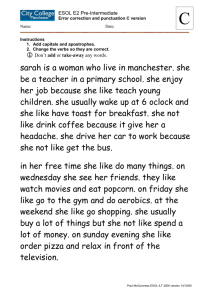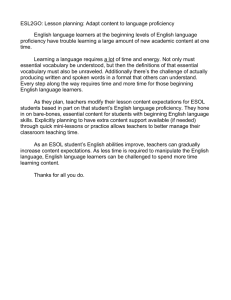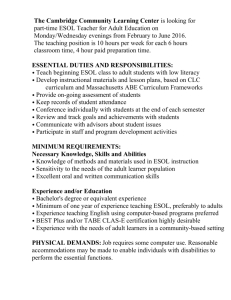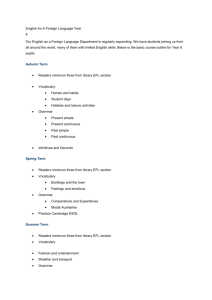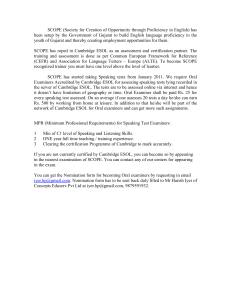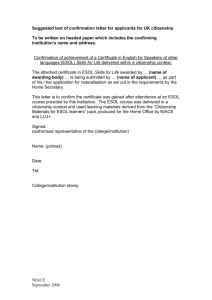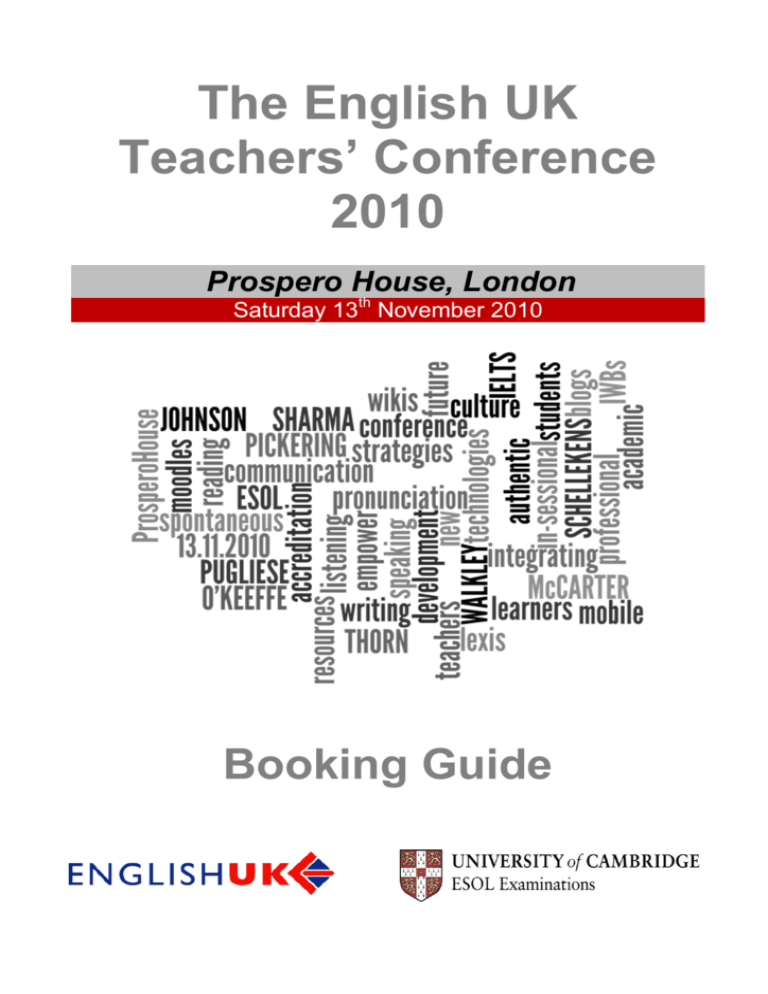
The English UK
Teachers’ Conference
2010
Prospero House, London
Saturday 13th November 2010
Booking Guide
English UK Teachers‟ Conference 2010
Saturday 13th November, Prospero House, London
The conference
The annual English UK Teachers‟ Conference supported by
Cambridge ESOL is one of the UK‟s premiere ELT events for
teachers and is one of the highlights of the English UK
Professional Services programme. The national conference
provides an excellent opportunity for teachers to network, share
experience with colleagues and attend a range of first-class and
practical teacher development sessions.
Set in a contemporary and stylish purpose-built venue, the conference will offer lively, practical and
innovative sessions that will help delegates to develop a range of skills and keep up to date with the
latest research and trends in the field. We appreciate Cambridge ESOL‟s continued support of our
conference programmes and their involvement means that we can bring you such a high quality and
affordable event.
The programme
We are delighted to be able to offer you another first class and intriguing programme. We have are
lucky to be hosting some of the industry‟s best known speakers while at the same providing
opportunities for up and coming speakers to give voice to their ideas and innovation. I‟m sure that
you are going to have a truly thought-provoking and inspiring day. We have further increased the
choice of session on offer and welcome ESOL teachers for the first time to our event thanks to our
tie up with the British Council.
Our track record
Feedback from previous teachers‟ conferences:
“Another very successful event, and a very valuable way to spend a Saturday! As a long serving teacher it is
very exciting to constantly experience the stimulus of new and challenging ideas, especially those that
question what so many take as 'the norm'.”
anon
"A very interesting and stimulating day with excellent presentations, giving plenty to think about and talk
about"
Tim Potter, South Thames College
"It just gets better and better and it is really difficult to conceive how you could produce a more seamlessly
professional and edifying experience"
Mike Gill, St Giles Eastbourne
We don‟t like to blow our own trumpet but... in feedback obtained from 55% of last year‟s
participants, delegates rated the location at 4.5 out of 5.0 (on a scale from poor to excellent), the
value for money of the event at 4.3, the service provided by English UK at 4.4, and the overall
programme at 4.2. A great and worthwhile day out and 99% of delegates said they would
recommend the event to a colleague!
Supported by
www.englishuk.com/en/training
The package
As well as receiving a conference pack and strong programme of ELT professional
development delegates will enjoy a light continental breakfast upon arrival, a fabulous buffet
lunch, and refreshments throughout the day. There will also be an ELT exhibition and delegates
can find out more about: English Profile, British Council, IATEFL, Accreditation UK, The
Copyright Licensing Agency (CLA), Cambridge ESOL, English UK, Cambridge University Press,
Oxford University Press, Macmillan Education, Trinity College London, Cengage Learning (who
will be showcasing the latest Delta publishing titles), North Star ELT (TBC), Pearson Longman,
Garnet Publishing and the Macmillan English Campus who supply members with the English
UK Campus.
The venue
A purpose-built conference venue located in central London,
Prospero House provides an ideal learning environment with
state of the art technology, modern decor and rooms that
benefit from natural daylight. The venue is conveniently
located near London Bridge and has excellent access by
public transport.
Travelling by tube
Nearest stations are on the Northern
line - there are regular Underground
services from all Underground stations
to Borough or London Bridge (also on
Jubilee Line).
London buses
There are regular buses from Liverpool
Street and London Bridge to Borough
High Street. Liverpool Street: 35, 133.
London Bridge: 35, 40, 133, 343, 21
Address
Prospero House, 241 Borough High
Street, London, SE1 1GA Tel: 020
7105 6010 Fax: 020 7105 6016
http://www.etcvenues.co.uk/venues/pro
spero_house/
Cambridge ESOL Examinations
The popularity of Cambridge ESOL exams continues unabated with over 3.5 million candidates
every year in over 130 countries. Delegates will have the opportunity to hear more about how
important the CAE exam has become in becoming recognised for university entry at Lee
Knapp‟s session and about wider developments during Henry Tolley‟s opening address.
Candidate numbers are expected to continue to rise as Cambridge ESOL publishes exam dates
for the next two years with a focus on new summer dates and a continuation of its expansion of
computer-based testing. The awarding body has significantly more of its tests approved for tier
4 than any other awarding body and is also investing in providing easily accessible support
materials which will be of interest to teachers.
Supported by
www.englishuk.com/en/training
Conference programme overview
9.15-10.00
Registration: breakfast, refreshments and exhibition
10.00-10.05
Opening address: Henry Tolley - What’s going on at Cambridge ESOL?
10.05-11.00
Opening plenary: George Pickering – Getting off to the best possible start: the
importance of beginnings
11.00-11.30
Break: refreshments and exhibition
11.30-12.20
Elective sessions (1)
Pete Sharma
Elective 1B.
English on the move: a critical analysis of mobile
technologies
Are you speaking comfortably?
Elective 1C.
The IELTS academic reading and writing module
Sam McCarter (Macmillan Education)
Elective 1D.
Caroline Moore
Elective 1E.
New generation learning: is there a future for the
coursebook?
Pronunciation of English as lingua franca
Elective 1F.
Waxing lyrical about lexis
*Elective 1G.
Teaching reading in the ESOL classroom
(British Council ESOL strand)
Aim higher
Elective 1A.
Elective 1H.
Phyllida Furse (Voice Care Network)
Robin Walker (Oxford University
Press)
Richard Ostick
Philida Schellekens
Lee Knapp
12.20-12.30
Room transfer
12.30-13.20
Elective sessions (2)
Elective 2A.
Authentic listening from a student’s perspective
Sheila Thorn
Elective 2B.
Once is not enough
Andrew Walkley (Cengage Learning)
Elective 2C.
English Profile: looking at what learners know
Anne O‟Keeffe
Elective 2D.
Video authentic resources and communication skills
Frances Eales (Pearson Longman)
Elective 2E.
Integrating pronunciation
Lisa Pick
Elective 2F.
Learning English is depressing: motivation and
needs in EFL and ESOL classes
Exploring the EFL/ESOL divide and online
professional development (British Council ESOL
strand)
British Council inspection: opportunity or ordeal?
Paul Gallantry
*Elective 2G.
Elective 2H.
Wilson, Wilkinson, Harrison and Bird
Elizabeth McLaren (British Council)
13.20-14.20
Buffet lunch and refreshments in the exhibition hall
14.20-15.10
Elective sessions (3)
Elective 3B.
(Almost) Everything you wanted to know about IWB’s
but were afraid to ask
Empower your learners with speaking strategies
Elective 3C.
Culture in our classrooms
Leslie Anne Hendra (Cambridge
University Press)
Gill Johnson (Delta Publishing)
Elective 3D.
Moodles, wikis and blogs, but what of the didactics?
Julie Wallis
Elective 3E.
Sit back, relax (more or less) and let the learners do
all the work
Current Developments in the delivery of in sessional
academic skills (Ask) in Applied Sciences (AS)
Teaching and learning resources
(British Council ESOL Strand)
Using spontaneous examples effectively
Michael Berman
Elective 3A.
Elective 3F.
*Elective 3G.
Elective 3H.
Pete Sharma
Glynis Brydon and Anna Lindsay
Wilson, Wilkinson, Harrison and Bird
Mark Smith
15.10-15.30
Break: refreshments and exhibition
15.30-16.30
Closing plenary: Chaz Pugliese – Creative teaching: optional extra or absolute
must?
*The British Council ESOL Strand
Supported by
www.englishuk.com/en/training
Sessions and speakers
10.05 – 11.00 The Opening Plenary
Getting off to the best possible start: the importance of beginnings
George Pickering
Hello, good morning and welcome! You never get a second chance to make a good first
impression or to capture the attention of learners at the beginning of a lesson or a talk. Most ELT
professionals would agree that it is important to start any learning experience effectively whether
it is a conference, a talk or a lesson. In this seminar we will explore some of the psychological
principles, structures and options that underlie effective openings. We will discuss the importance
of rapport, welcomes, humour, personalisation, realia, warmers, stories, environment, and
attention grabbing devices. We will also consider the extent to which language teachers should
apply principles from psychology in their teaching.
George Pickering is an educational coach, trainer and consultant. He has delivered talks and
workshops in over 50 different countries for the British Council, Pearson Longman and other
organisations. George is the lead tutor on the English UK Diploma in ELT Management and is an
inspector of language schools for the British Council in the UK (Accreditation UK). He is the
director of the Bell Teacher Campus at Homerton College, Cambridge. George was the treasurer
of IATEFL (International Association of Teachers of English as a Foreign Language) for six years
and is the co-ordinator of the IATEFL Leadership & Management Special Interest Group
(LAMSIG). He trained as a state school teacher, before becoming an ELT teacher, has an MA in
Applied Linguistics and is a Master Practitioner and certified trainer in NLP. George lives with his
pet camel and monkey in Ramsgate, England, and can be contacted at: georgeuk32@aol.com
11.30 – 12.20 Elective Sessions 1
1A. English on the move: a critical analysis of mobile technologies
Pete Sharma
The teacher asks a question. The student googles the answer on their iPhone. What do you do?
One angry teacher tells the student to turn off their mobile phone; another teacher praises the
student for being so motivated! What does the language teacher need to know about the growing
phenomenon of 'M-Learning' - mobile learning?
This workshop explores a number of definitions of the term 'M-Learning'; a range of hardware
from e-book readers, tablet PCs and Smartphones to the iPad; software from publisher-produced
exercises, eWorkbooks, electronic dictionaries and vodcasts to sexy free 'apps' for the iPhone
and Google Android. It looks at the crucial issue of pedagogy, both inside and outside the
language classroom, and concludes with a number of practical teaching ideas. And you don't
need an iPhone to attend.
Pate Sharma is a Director of Pete Sharma Associates, an organisation which runs training in
educational technology. He worked for many years in business English and is currently working
as a university lecturer in English for Academic Purposes. Pete is a regular conference presenter
at IATEFL and BESIG conferences. He has co-written books on technology in language teaching,
including Blended Learning (Macmillan) and 400 Activities for using the interactive whiteboard
(Forthcoming 2011). He has also written CD-ROMs for Macmillan‟s In Company series, and a
regular e-lesson which has thousands of subscribers worldwide. He can be contacted via his
website: www.psa.eu.com
Supported by
www.englishuk.com/en/training
1B. Are you speaking comfortably?
Phyllida Furse (Voice Care Network)
The voice is the Teacher‟s key tool of the trade. With it we have the power to explain,
encourage, inspire and admonish. The very sound of it can draw the listener in or send them
running! Yet how much do we know about its care and maintenance? How to deal with the
ongoing physical pressures of „performing‟ in the classroom? It is not until the voice suddenly
goes on strike that we give any thought to its production or what our own possibilities are. They
ways in which we breathe, stand, articulate and release tension all combine to reinforce or ruin
the message. How many of us bother to warm up the voice muscles before the vocal marathon of
the teaching day – or even to cool them down?! In this seminar, Phyllida will give practical tips on
keeping your voice sounding stronger for longer, and being a pleasure to listen to!
Phyllida Furse is an experienced teacher of Modern Foreign Languages (French and Italian)
and Voice. As Development Officer of the Voice Care Network UK, she both designs and delivers
training in Voice Care and Development to professional voice users nationally. As well as
numerous teachers, lecturers and Local Authorities, her clients have included NHS Direct, M&S
Money, the Department of Work and Pensions, Immigration Officer Trainers of UK Borders, and
„Re-speakers‟ in the BBC, who generate news subtitles for the deaf using their voice. Improving
pronunciation for non-native speakers of English is an increasing part of her work. As well as
promoting vocal health, a passion for developing clarity and confident spoken communication
underpins her all work.
1C. The IELTS academic reading and writing module
Sam McCarter (Macmillan Education)
The talk will cover methodology and strategies on developing reading skills for learners preparing
for the academic version of the IELTS and show how reading can also improve writing
development, and vice versa. The talk will look at the organization of „information sequences‟ in
texts and paragraphs, and examine paragraph types and text types, the functions/ purpose of
texts and paragraphs in reading. The relevance of this for all aspects of all four skills will be
highlighted, but especially reading and writing.
A range of strategies and techniques will be looked at relevant to different levels of competence
in the academic version of IELTS. Relevant language, including the encouragement of building a
greater awareness of collocations in both reading and writing, the use of „shell/ carrier nouns‟ and
the need for grammar to fit the task rather than just following a grammar-focused syllabus will be
touched on. There will be a workshop element with teachers looking at sample texts to illustrate
the talk.
Sam McCarter’s teaching career spans a period of more than 30 years, starting in Sierra Leone
in West Africa as a volunteer. He has taught a wide range of subjects ranging from Latin to
academic English and ESP, having taught English for medical purposes to postgraduate health
professionals primarily doctors since the mid-80s. Sam is the author of a number of textbooks for
IELTS published by Macmillan and IntelliGene, and medical English for OUP. He has also edited
glossaries for CD-ROMs on Tropical Medicine. Sam teaches IELTS and ESP (English for Medical
Purposes) by video-conferencing in a UK teaching hospital.
1D. New generation learning: is there a future for the coursebook?
Caroline Moore
The emergence of digital media, particularly social networking and mobile technologies, is fast
transforming how we experience the world, carry out our business, and how we learn. Learners,
teachers and educational authorities are beginning to expect digital resources, often for free.
Course materials need to reflect how learners will actually use English, and the current paradigm
of coursebooks with sequential learning needs to be replaced by more granular content that fully
exploits the new media and is relevant to the lives and interests of language learners.
Supported by
www.englishuk.com/en/training
To date the ELT sector has been very conservative and has found technological innovation
difficult, and publishers are not sure how they should respond and when and how they will make
money in this new context. I will report on the findings from my detailed investigation into the
needs of learners, teachers, and course providers, together with analysis of possible business
and delivery models.
Caroline Moore is Director of Constellata Limited, which specialises in consultancy and product
development for digital language learning. Before starting the company Caroline held senior
level posts at the British Council where she founded its successful websites LearnEnglish and
Teaching English, and led its IT and e-learning functions in English and Exams. She has a long
standing interest in language learning technologies, is a former coordinator of IATEFL‟s Learning
Technology SIG, has an MA in Second Language Learning and Teaching, and recently
completed an MBA at Cass Business School.
1E. Pronunciation of English as lingua franca
Robin Walker (Oxford University Press)
The role of English in the world has changed quite dramatically over the last two decades or so,
and it is now used very extensively for international communication in business and technology,
frequently in the absence of any native speakers. This change brings with it the need to review
traditional targets for learners of English, especially with respect to pronunciation. New targets
require us, in turn, to re-define the profile of the ideal instructor.
Robin Walker is a freelance ELT consultant, language teacher and materials writer. He has been
involved in English language teaching since moving to Spain in 1981. In this time, he worked
principally as a lecturer in English at the Escueal Universitaria de Turismo de Asturias. He has
also worked extensively in collaboration with many of Spain‟s state Teacher Training Centres,
with the University of Oviedo, and with OUP España. Robin is co-author of Tourism 1 (Provision),
Tourism 2 (Encounters) and Tourism3 (Management) in OUP‟s Oxford English for Careers
series, and is currently preparing Teaching the Pronunciation of English as a lingua franca for the
OUP teacher‟s handbook series. A former Vice-president of TESOL-SPAIN, he is the Newsletter
editor of the IATEFL Pronunciation Special Interest Group.
1F. Waxing lyrical about lexis
Richard Ostick
It has been over 17 years since Michel Lewis pioneered The Lexical Approach, yet we still see
publishers, materials writers and most importantly, teachers obsessing that the key to improving
one‟s English is through mastering the English grammar systems. So, has the lexical approach
been forgotten?
Although it has had its criticisms, there is still so much we can still take from it, certainly in terms
of its views on the nature of language and how language is learned. I believe we need to see
lexis, rather than grammar (in the tradition sense), as central to learners‟ success and progress.
In this talk I intend to look at what “a more lexical approach” is, and why I feel it is so important,
both from a learner‟s and teacher‟s perspective. I hope to leave you with the conclusion that
elements of The Lexical Approach are still highly relevant to our teaching and key to our learners
making rapid progress!
Richard Ostick (BSc in Politics & Sociology, DELTA, CTEFLA, and Diploma in NLP) has worked
in EFL for almost 15 years. He has taught in both the Czech Republic and in Spain but has spent
the bulk of his career at the Kingsway English Centre, in Worcester, where he has been the DoS
for the last 7 years. Richard is responsible for all academic aspects of the business and really
enjoys different aspects of teacher training. He is a strong believer in a more lexical approach
and that pronunciation should have a high priority on all language courses.
Supported by
www.englishuk.com/en/training
1G. Teaching reading in the ESOL classroom
Philida Schellekens (British Council ESOL Strand)
The aim of this session is twofold. The first is to provide a brief introduction to the world of ESOL
(English for Speakers of Other Languages) for those who are not familiar with it. The second is to
reflect on the delivery of language teaching in the light of recent research. We shall start with
some of the key features of ESOL provision, including an overview of the learners and the types
of classes open to them as well as major external factors which influence classroom delivery,
such as funding, qualifications and inspection.
The second part of the session will focus on the impact of the Skills for Life strategy on the
teaching and learning of ESOL. This is especially in the light of recent thought-provoking
research on language acquisition. These give new insight into how adults acquire English. For
example, studies show that the effectiveness of these 'sub-skills' approach is in doubt, i.e.
teaching language learners how to skim and read for gist etc. The treatment of listening solely as
comprehension is also due for reconsideration. These aspects are particularly relevant for Skills
for Life ESOL, with its poorly structured standards and core curriculum. However, these aspects
also apply to EFL teaching. Time to reflect on what we do in the classroom!
Philida Schellekens is a consultant, associate inspector, teacher and teacher trainer in the field
of language learning, particularly English for migrants and refugees. Recent publications include:
The Oxford ESOL Handbook (2007), Oxford University Press; and Cause and effect: The Impact
of the Skills for Life Strategy on Language Assessment. Studies in English Language Testing
(2009) from Cambridge University Press
1H. Aim Higher
Lee Knapp (Cambridge ESOL)
In recent years, demonstrating core competence in English for entry into Higher Education has
become the domain of just one or two qualifications. In the rush to adopt or deliver only the
dominant qualifications to meet this requirement, the fitness for purpose of other valid and
reliable awards is not always universally recognised.
In this session, Lee Knapp of Cambridge ESOL will show how Cambridge English: Advanced
(traditionally known as CAE) offers a powerful option for schools preparing students to enter UK
higher education institutions. He will give details of the inclusion of CAE Grade A (and CPE) in
the UCAS tariff - the only English language qualifications for non-native speakers accorded that
highly-prized status. He will also demonstrate Cambridge ESOL's results verification website, a
new service which will help language schools and colleges, universities, employers, border
agencies etc to validate the Cambridge ESOL examination results of international students
quickly and securely.
Lee Knapp has responsibility for the development of strategies to maximise candidature for
Cambridge ESOL examinations in the UK, also seeking out other business growth opportunities
for the full range of Cambridge ESOL products and services. Lee represents the Federation of
Awarding Bodies on the National ESOL Forum, advising the Department for Innovation,
Universities and Skills of the UK government. Lee‟s involvement in language teaching dates back
to the early 1970‟s, and his career has taken in Germany, the Gulf States and the UK. He has
undertaken developmental roles in several organisations, including senior marketing positions in
Further Education and the private sector. Lee is the co-author of “Write for Business” (published
by Longman in 1987) and is a Member of the Chartered Institute of Marketing. He holds an MA in
Applied Linguistics.
Supported by
www.englishuk.com/en/training
12.30 – 13.20 Elective Sessions 2
2A. Authentic listening from a student’s perspective
Sheila Thorn
In this session we shall consider the significant differences between listening in L1 and listening
in L2. We shall begin by looking at the four stages which both native speakers and non-native
speakers pass through in any listening situation:
Stage 1:
Stage 2:
Stage 3:
Stage 4:
The external knowledge we bring to the listening situation which
helps us to infer, even before we begin listening.
Decoding – recognising the sounds which make up words.
Constructing meaning based on the words we recognise and
inference.
Revising our understanding of the meaning as new information
comes in.
Using concrete examples from my own teaching, language learning and life experience, I shall
demonstrate the challenges both native speakers and our students face at each of these four
stages. We shall then go on to look at practical ways we can help students improve their listening
ability at each stage of the listening process.
Sheila Thorn is an experienced teacher, teacher trainer, examination and materials writer, with a
particular interest in authentic listening. She is the founder of The Listening Business and
supplies language schools, FE colleges and universities all over the UK with listening materials
based on BBC radio programmes. She is also the author of the Real Lives, Real Listening series
and regularly gives presentations at conferences in the UK and overseas.
(www.thelisteningbusiness.com)
2B. Once is not enough
Andrew Walkley (Cengage Learning)
Students need repeated comprehensible exposure to language in order to learn it. In this talk I'll
look firstly at how our teaching and correcting of students can ensure more recycling of language.
Then I'll briefly look at how coursebook design can help - with reference to Outcomes. We'll then
look at some simple revision activities for class that require little or no planning. The talk starts
with an anecdote about learning Korean names in my class, which leads to a reflection on what is
involved in learning, remembering and using language. This highlights:
the value of learning by heart and its limits
the need for repeated encounters with the same language over time
the need for each encounter to be comprehensible and noticed
the importance of noticing grammar and collocations that go with 'new' words
the value of creating associations to help remember expressions
the need for revision to happen in class
the importance of the way teachers relate to students
I look at briefly how teachers can help, how the design of Outcomes ensures plenty of revision. I
will then workshop a number of activities - some based on materials from Outcomes - which are
adaptable to a very wide number of teaching situations.
Andrew Walkley teaches general English at the University of Westminster, London. Over the
last few years he's been writing the coursebook series Innovations with Hugh Dellar and trialling
the material in his classes. In the summer he runs a teacher training programme at the university
and has been involved in developing a new "Intensive Speaking" course, also at Westminster.
Supported by
www.englishuk.com/en/training
2C. English Profile: looking at what learners know
Dr. Anne O‟Keeffe
English Profile is a global community programme that uses corpus-based research to illustrate
and clarify the can-do statements in the CEFR levels in an easily understandable way. Recent
discoveries show how learners progress through the levels, including typical grammar and
vocabulary patterns and learner errors. I will show how insights from our research can be very
valuable for teachers and learners, and encourage you to join our programme.
Dr Anne O'Keeffe is Senior Lecturer in ELT at Mary Immaculate College, University of Limerick
in Ireland. She has seventeen years‟ experience as a teacher of English and teacher trainer. She
is currently writing grammar materials. In addition to writing ELT materials, she is author of
numerous journal articles and book chapters, as well as three books. Her latest book, with
Michael McCarthy and Steve Walsh, is entitled „The Vocabulary Matrix: understanding, learning,
teaching‟ (2009, Heinle, Cengage Learning).
2D. Video authentic resources and communication skills
Frances Eales (Pearson Longman)
There is a plethora of video material available outside and inside the classroom for our
Generation Y students. Besides being a great motivator, what do learners actually gain in terms
of skills and language development when video is used in class? To what extent is the use of
video an extension of the use of audio to develop listening and speaking? What new dimensions
does it bring in terms of learner development?
Frances Eales is a teacher and trainer who has worked for over 25 years in the UK, Hungary,
Germany, Russia, Australia, New Zealand, Egypt, Hong Kong and Thailand. She is a co-author
on the Cutting Edge series (Pearson) and now teaches and trains in London and Brighton. She
helped design and co-ordinate the Distance DELTA online course (International House
London/British Council) and now works on the design and assessment of teaching and teacher
training exams for Cambridge ESOL. Her interests include the use of authentic materials,
listening and speaking skills, and task based learning. Frances is an author of the new Pearson
Longman course, Speakout, developed in association with the BBC, to be published early 2011.
2E. Integrating pronunciation
Lisa Pick
The most common feedback from the British Council is that teachers don‟t focus enough on
pronunciation and correction. This workshop is designed for teachers who feel they are struggling
to integrate pronunciation into their lessons. There will be many practical ideas on how to exploit
material from the most popular text books used in the classroom. We‟ll look at speaking and
listening activities that focus on connected speech, stress and intonation, and ways to present
grammar through phonetics. You‟ll find there are even activities that can help with basic
sentencing and punctuation - problems that are very common in low level IELTS classes. To top
it all, there will be a grand finale of song and dance to spread the fun in phonology!
Lisa Pick is a teacher, trainer and Cambridge examiner who firmly believes in a hands-on
approach. She has worked in Hong Kong, Barcelona and now is Head of Teacher Training at
British Study Centres in Brighton and is an active member of the Brighton Trainers. She has
given lectures and workshops on music and technology, dictation and phonology, and has also
written materials based on modern and classic literature integrating film clips. I have attached a
photo, I'm afraid I'm the kind of person who prefers to take pictures rather than be in them, so it
has been hard for me to find one, apart from those of my recent marriage! If you do think that the
workshop is suitable then I can always get another taken.
Supported by
www.englishuk.com/en/training
2F. Learning English is depressing: motivation and needs in EFL and ESOL
classes
Paul Gallantry
The aim of this workshop is to examine language learning motivations in EFL and ESOL students
and the possible reasons why students become de-motivated and discontinue their studies. We
will look at how students react to language within an English-speaking environment and culture
and discuss whether there is such a thing as a linguistic hierarchy of needs, with reference to
Maslow‟s theories. We will also look at „peak‟ experiences and how the themes covered in
language lessons can lead to student de-motivation.
This workshop was inspired by a piece of research that suggests people who chat more are more
likely to be depressed, while those who engage in more „meaningful‟ discussions are more likely
to be happy. Having done some research with students in my classes, I became interested in the
reasons why students often feel depressed or diminished while using English, and the coping
strategies they use to avoid a given language situation.
Paul Gallantry has been teaching English since 1993. He is currently Programme Leader for
Part Time EFL classes and Exams Coordinator at Reading College, where he has worked since
2000. Prior to that, he was Director of Studies at Dilko English, a large private language school in
Istanbul. He delivered well-received workshops at the English UK teachers‟ conferences in 2007
and 2008 and enjoyed the experience so much he wants to do it again! He is currently interested
in researching student motivation and why some students achieve fluency while others do not.
2G. Exploring the EFL/ESOL divide and online professional development
Amanda Wilson, Callie Wilkinson, Mike Harrison and Phil Bird
British Council ESOL Strand
The session follows on from „Teaching reading in the ESOL classroom', and will commence with
a brief overview of the perceived differences between ESOL and EFL, and common preconceptions and applied stereotypes associated with each. We will assess whether there is any
credibility in claims made that a distinction exists between the two strains of English Language
Teaching and upon what basis these claims exist. We will consider the methodology and
language acquisition theory which underpins much EFL material, and evaluate its relevance in an
ESOL context.
Secondly, the session aims to promote the importance of ESOL practitioners evaluating their
subject knowledge in order to identify ways in which they can enhance their practice. It sets out to
suggest how the British Council website may be used to address any identified areas for
improvement, for instance in terms of accessing training and reading material and engaging with
like-minded professionals.
The site will provide a forum in which ESOL teachers can liaise and collaborate and put forward
suggestions with regard to how the Council can support the needs of ESOL teachers and
learners, in accordance with its ongoing vision to support integration strategies and facilitate
community links.
Amanda Wilson has over fifteen years' experience in English Language Teaching and currently
works at Boston College as a teacher and teacher trainer. She has also lived and worked in
Spain and South America and her love of all things Spanish continues today. She is very involved
in an online professional community and likes to blog with her students.
Callie Wilkinson teaches ESOL at Boston College in Lincolnshire. She has experience of
working with ESOL learners at all levels, and has a particular interest in teaching 16-19 groups.
She enjoys using technology and Web 2.0 in her practice, both for professional development and
to enhance the language learning experience of her students.
Supported by
www.englishuk.com/en/training
Mike Harrison is an ESOL teacher at Bromley College of Further and Higher Education. He has
previously taught EFL in Pamplona and A Coruña in Spain. His interests include using video,
images and music in the classroom. He writes a blog at http://mikeharrison.edublogs.org where
he shares his teaching experiences, lesson plans and idea. You can follow him on Twitter at
@harrisonmike.
Phil Bird teaches at Barking and Dagenham College in East London. He has taught Functional
English, ESOL and Spanish in FE Colleges. Before this he taught in Asunción, Paraguay and
Córdoba, Argentina. He is particularly interested in using technology in the language classroom
and for staff development. As well as teaching, he is currently working on a project adapting
British Council materials for use with ESOL learners, has started giving conference presentations
and writing a blog on teaching and using new technologies, which you can find at
http://classroom201x.wordpress.com. Away from teaching, he also has a keen interest in
translation studies.
2H. British Council inspection: opportunity or ordeal?
Elizabeth McLaren (British Council)
Although there are only eight criteria in the classroom observation section, observing teaching
takes a significant proportion of the inspection and teachers may feel a huge responsibility for the
success of their institution at inspection. There are very few people who enjoy being inspected
but does it have to be an ordeal?
The session will explore this and other questions about the inspection process:
What are the inspectors looking for?
How can staff prepare for inspection?
How can an inspection help teachers?
Participants will also have the opportunity to give feedback on their experience of inspection, the
existing criteria and inspection processes, and make suggestions for the future development of
Accreditation UK.
Liz McLaren is the Manager of the British Council Accreditation Services. She has a BA in
English and Drama and an MA in English Literature. She taught English in Spain before joining
the British Council and has worked in the Accreditation Unit for 17 years, seeing through many of
the developments in the Scheme over the years. As Manager Accreditation UK she is now
responsible for the day-to-day management of the Scheme, the accreditation team in
Manchester, inspectorate and ASAC.
Supported by
www.englishuk.com/en/training
14.30 – 15.10 Elective Sessions 3
3A. (Almost) everything you wanted to know about interactive whiteboards
but were afraid to ask
Pete Sharma
“I love my interactive whiteboard (IWB) and my students love it too”.
“Why would we spend our budget on an IWB? How can you prove they improve learning?”
Nothing typifies the „digital divide‟ in language teaching quite as much as the interactive
whiteboard (IWB). It has been described by enthusiasts as a „powerful learning tool‟, and by
detractors as 'an interactive white elephant‟. This presentation will describe the hardware,
including portable alternatives, and then present four approaches to using the software. It will
describe features, benefits and drawbacks of IWBs and present a number of practical teaching
ideas drawn from '400 Activities for using the interactive whiteboard', (Forthcoming 2011: Pete
Sharma, Barney Barrett and Francis Jones) in the well-known Macmillan Books for Teachers
series.
Pete Sharma is a Director of Pete Sharma Associates, an organisation which runs training in
educational technology. He worked for many years in business English and is currently working
as a university lecturer in English for Academic Purposes. Pete is a regular conference presenter
at IATEFL and BESIG conferences. He has co-written books on technology in language teaching,
including Blended Learning (Macmillan) and 400 Activities for using the interactive whiteboard
(Forthcoming 2011). He has also written CD-ROMs for Macmillan‟s In Company series, and a
regular e-lesson which has thousands of subscribers worldwide. He can be contacted via his
website: www.psa.eu.com
3B. Empower your learners with speaking strategies
Leslie Anne Hendra (Cambridge University Press)
Speaking strategies address the real-life, immediate needs of learners, enabling them to cope
confidently with unpredictable situations when they suddenly find themselves lacking knowledge
or linguistic ability. In addition, they help learners to exploit opportunities for communication and
manage complex language tasks more effectively.
These strategies include such things as checking understanding, summarising information, giving
oneself time to think, and managing a discussion. This important area is sadly neglected in
coursebooks – certainly as a regularly occurring, prominent feature – and exponents suggested
by other sources need to be carefully evaluated for frequency and naturalness before we teach
them to our learners. In this workshop, we‟ll consider how to select goals for different levels,
choose „real‟ language, and create useful contexts for practice activities.
Leslie Anne Hendra is a teacher and trainer, with fifteen years' experience of teaching and
writing in-house course materials in Japan, as well as four years of teaching at International
House London. For the past four years, she has been working full-time as co-author of English
Unlimited, the new English language course for adults published by Cambridge University Press.
She co-authored the Elementary, Pre-intermediate, Intermediate and Upper Intermediate
coursebooks as well as the Upper Intermediate Teacher‟s Notes and Printable Activities. The
course features a page devoted to speaking strategies in every second unit. Leslie has an MA in
Classics.
Supported by
www.englishuk.com/en/training
3C. Culture in our classrooms
Gill Johnson (Delta Publishing)
Teachers working in all sectors of education across Europe tell us that over the last 15 years,
their classes have changed almost beyond recognition; such has been the tide of immigration.
Hitherto, teachers had mainly mono-cultural classes of the sort to which they were accustomed
as students. Now, classes are rarely so, and teachers are increasingly under pressure to perform
in the face of, sometimes, difficult attitudes from students and parents alike. This is
understandable; we often fear the unknown, but what if we offered frameworks via which some of
the tensions might be diffused?
As EFL teachers, working in the UK, we are accustomed to working with multi-lingual, multicultural classes for much of the time, but how much do we use the different backgrounds of our
learners to provide our students with the opportunity of understanding more about the beliefs,
values, and behaviours of the cultures present in their classes? Opening „Pandora‟s box‟ is
dangerous, isn‟t it? Or is it? What if there were activities to help us „open the box‟ with
confidence? The session will look at what culture is, how we view it and will provide some fun
exercises which get students safely exploring and sharing cultural differences.
Gill Johnson has been a teacher and trainer of EFL for over twenty years. She has worked in
many contexts, teaching students training teachers, speaking at conferences and has just cowritten (with Mario Rinvolucri) and recently published her first book “Culture in our Classrooms”
(published by DELTA 2010)
Apart from writing with Mario, She works in an international boarding school, near Hastings,
where she teaches French and English and manages a busy languages dept. In her holidays
she‟s either to be found working on Pilgrims‟ teacher training programmes, or somewhere on the
other side of the planet, running CELTA courses and teacher training workshops. She enjoys
speaking at conferences and when She‟s not doing any of these things, She likes to relax at
home, entertaining guests, or spending time with her very patient husband, „hanging out‟ with her
(now grown-up) children, reading, chatting and chuckling with friends…. or sleeping!
3D. Moodles, wikis and blogs, but what of the didactics?
Julie Wallis
In our profession we are increasingly under pressure to use modern technology in face-to-face
and distance learning courses. However, what most of us really need are fast solutions to
creating materials and resources from what we already have at hand that can be tailored to our
clients‟ needs. For the learner, they need to be slick, polished and effective. For the teacher, they
need to be easy to produce, simple to use and help achieve objectives. In this workshop we‟ll be
looking at how to create highly personalized interactive resources from our course books. We‟ll
be making movies, brainstorming and counseling. You don‟t need to be a „techie‟ to do any of it.
Julie Wallis has been teaching for the past 23 years. She set up the London school 20 years
ago and it is now one of the leading language schools in the Veneto, Italy. She now dedicates
much of her time to creating seminars and training courses and holding workshops for AISLi
(www.aisli.com). She is particularly interested in developing personalized resources for different
types of learners with very different needs to help them become successful language learners.
Supported by
www.englishuk.com/en/training
3E. Sit back, relax (more or less) and let the learners do all the work
Michael Berman
In this workshop, techniques will be demonstrated that can be used when storytelling to ensure
that the learners take an active part in the session and that you, the teacher, don‟t end up having
to do all the work. The intention is to make sure that you will be able to go home at the end of it
with material that requires next to no preparation that you can then use with your own classes.
No theory this time, just an hour packed with practical stuff.
Michael Berman PhD works as a teacher and a writer. Publications include The Power of
Metaphor for Crown House, The Nature of Shamanism and the Shamanic Story for Cambridge
Scholars Publishing, Shamanic Journeys through the Caucasus for O-Books, and All God‟s
Creatures: Stories Old and New for Pendraig Publishing. ELT publications include „A Multiple
Intelligences Road to an ELT Classroom, In a Faraway Land‟ (a resource book for teachers on
storytelling), and On Business and for Pleasure (a self-study workbook).
Although Michael trained as a Core Shamanic Counsellor with the Scandinavian Centre for
Shamanic Studies under Jonathan Horwitz, these days his focus is more on the academic side of
shamanism, with a particular interest in the folktales with shamanic themes told by and collected
from the peoples of the Caucasus. For more information please visit:
www.Thestoryteller.org.uk
3F. Current developments in the delivery of in sessional academic skills
(ASk) in Applied Sciences (AS)
Glynis Brydon and Anna Lindsay
The presentation presents findings from joint research undertaken by two tutors, a subject
specialist from Applied Sciences and an Academic Skills specialist. Using the CEM model
(Contextualisation, Embedding and Mapping) (Sloan & Porter, 2010) it outlines the impact of the
model on pedagogical approaches in Applied Sciences. When embarking in 2007 on the delivery
of a post graduate module, the subject specialist involved in this research was in agreement with
the perceptions of Hyland and Hamp-Lyons that Academic Skills tutors “work for rather than with
subject specialists” (2002). The two tutors therefore delivered some team teaching sessions
within the academic module in order to merge academic skills and subject knowledge for
complete contextualisation, therefore enhancing the student learning process.
Based on 2 years of research including written feedback, focus groups and statistical analysis of
module assessment marks, the presentation seeks to demonstrate the benefits of embedding,
contextualisation and team teaching and developments in pedagogical approaches. The results
to date support the views of Newman (2008) “… in which EAP tutors can collaborate with subject
tutors to ensure that teaching and learning materials are more sensitive to the needs of students
speaking English as a foreign language”.
Glynis Brydon is an English for Academic Purposes tutor within the Department of Languages
at Northumbria University. She currently teaches on pre-sessional and in-sessional courses
delivering the EAP programme in the School of Life Sciences incorporating Applied Sciences and
Sport and Psychology. She is also a Cambridge ESOL Skills for Life oral examiner and is
involved in marking FCE and BEC writing papers.
Anna Lindsay is a lecturer in the Department of Biomedical Sciences. Through the teaching of
Graduate Science Research Methods to a wide variety of nationalities she has become
increasingly aware of the needs of international students and is interested in pedagogical
approaches to enhance their learning experience. Both Glynis and Anna are keen new
researchers in the delivery and developments of EAP and in sessional learning in higher
education for international students.
Supported by
www.englishuk.com/en/training
3G. Teaching and learning resources
Amanda Wilson, Callie Wilkinson, Mike Harrison and Phil Bird
British Council ESOL Strand
A continuation of the previous session, the aim is to place the ESOL profession in a wider
context, encouraging teachers to draw upon existing tried and tested methodology and practice.
This will involve exploration of some of the existing materials available on the British Council
website, in order to demonstrate their suitability and potential in an ESOL setting, both for the
teacher and the learner. We will describe the Council‟s recent undertakings with regard to ESOL
materials and the evolution of the area on the site dedicated specifically to ESOL. This will
involve discussing areas which are felt to be lacking in terms of available quality resources, with
the aim of identifying specific ways of assisting ESOL teachers in their work. There will be
opportunities to gain new ideas and classroom inspiration and a focus on effectively incorporating
technology and Web 2.0 tools in a pedagogically sound way.
For bio-data details: see elective. 2G
3H. Using spontaneous examples effectively
Mark Smith
This workshop is primarily based on the teacher as a source of examples of language use. The
question “Can you give me an example?” can often find us tongue tied and/or dissatisfied with
what we have come up with. Has the student really taken on board what we have set out to help
them with? Is the example going to be remembered correctly, or will it actually hinder
understanding if recalled incorrectly.
Such problems are dealt with in three ways in this workshop. Firstly, we will look at some simple
improvisation techniques used in theatre to unlock the creativity within us all and improve teacher
confidence. Secondly, we will look at some methods of evaluation of examples used in class and
discover what criteria go into making a useful example. Thirdly, we will investigate ways of
encouraging the students to come up with examples themselves and put them into context.
Mark Smith is a teacher/teacher trainer who started teaching in Barcelona and returned to
England in the summer of 2001, when he began working at Wimbledon School of English, where
he remains. He teaches at all levels and has taught courses for all the Cambridge main suite
exams and also IELTS. He was observed teaching on the accompanying DVD of Jeremy
Harmer‟s How to Teach English. Mark also runs development workshops for other teachers.
This work has taken him as far as China, Poland, and the 2009 IATEFL Conference in Cardiff
and the 2009 English UK Teachers‟ Conference.
Supported by
www.englishuk.com/en/training
15.30 – 16.30 The Closing Plenary
Creative teaching: optional extra or absolute must?
Chaz Pugliese
My point of view is that teaching creatively can have a huge impact on the students‟ enthusiasm
and motivation, and as such, cannot and should not be confined to an exercise we do on a lazy
Friday afternoon. In this practical session, I will first debunk a few myths on creativity, I will then
look at different types of creativity, and I will outline strategies that can enhance our creative
potential. Finally, I will illustrate how these strategies can be implemented in the classroom. The
ultimate goal is for the teacher to design activities that are engaging both affectively and
cognitively, are simple to use, require little or no preparation and are fun to do in the classroom.
Chaz Pugliese is currently Director of Studies (Teacher Training) at Pilgrims, UK. A regular
presenter at international conferences, Chaz has contributed over 60 articles to several ELT
publications and has worked with teachers in over 25 countries. Chaz‟s first book (Creative
Strategies for Teachers) will be published by Delta in 2009. A second one (with Simon Mumford
and Mario Rinvolucri) on „Teaching Spoken Grammar‟ will be out in 2010. When he‟s not training,
Chaz likes to spend time with his family in Paris where he‟s based, and play the blues on his
beloved Gibson guitar.
Supported by
www.englishuk.com/en/training


